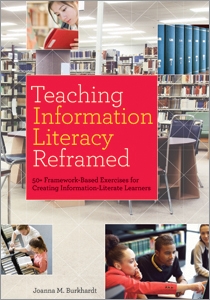
Primary tabs
You don't need to be an ALA Member to purchase from the ALA Store, but you'll be asked to create an online account/profile during checkout to proceed. This Web Account is for both Members and non-Members. Note that your ALA Member discount will be applied at the final step of the checkout process.
If you are Tax-Exempt, please verify that your account is currently set up as exempt before placing your order, as our new fulfillment center will need current documentation. Learn how to verify here.
- Description
- Table of Contents
- About the author
- Reviews
This book is available in e-book format for libraries and individuals through aggregators and other distributors—ask your current vendor or contact us for more information. Examination copies are available for instructors who are interested in adopting this title for course use.
The six threshold concepts outlined in the Framework for Information Literacy for Higher Education are not simply a revision of ACRL's previous Information Literacy Competency Standards for Higher Education. They are instead an altogether new way of looking at information literacy. In this important new book, bestselling author and expert instructional librarian Burkhardt decodes the Framework, putting its conceptual approach into straightforward language while offering more than 50 classroom-ready Framework-based exercises. Guiding instructors towards helping students cross each threshold, this book
- discusses the history of the development of the Framework document and briefly deconstructs the six threshold concepts;
- thoroughly addresses each threshold concept, scaffolding from the beginner level to the intermediate level;
- includes exercises that can be used in the one-shot timeframe as well as others designed for longer class sessions and semester-long courses;
- offers best practices in creating learning outcomes, assessments, rubrics, and teaching tricks and tips; and
- looks at how learning, memory, and transfer of learning applies to the teaching of information literacy.
Offering a solid starting point for understanding and teaching the six threshold concepts in the Framework, Burkhardt's guidance will help instructors create their own local information literacy programs.
List of Exercises
Acknowledgments
Introduction
Chapter 1 Decoding the Framework for Information Literacy
Chapter 2 Scholarship as Conversation
Chapter 3 Research as Inquiry
Chapter 4 Authority
Chapter 5 Information Creation as a Process
Chapter 6 Searching as Strategic Exploration
Chapter 7 Information Has Value
Chapter 8 Creating Exercises, Rubrics, Learning Outcomes, and Learning Assessments
Appendix: The ACRL Framework for Information Literacy for Higher Education
Bibliography
Index
Joanna M. Burkhardt
Joanna M. Burkhardt is Full Professor/Librarian at the University of Rhode Island Libraries. She is Director of the branch libraries in Providence and Narragansett and the URI Libraries Collection Development Manager. She earned an MA in anthropology from the University of Wisconsin–Madison and an MLS from the University of Rhode Island. She has taught information literacy to both students and teachers since 1999. She has given workshops, presentations, podcasts, keynote addresses, and panel discussions about information literacy. She is coauthor or author of four books about information literacy. She addressed the topic of fake news at the ALA Annual Conference in 2017 and designed a poster and bookmark on that topic for ALA Graphics.
"While this title is presented in the scope of academia, the information provided in its pages is valuable to any educational profession working with research and information … From choosing a topic to conducting Boolean searches to identifying authoritative resources, the lessons offer a complete guide. The exercises are up-to-date and refer to websites and media that are relevant to today's world. Anyone in a field that deals with information literacy could use this book as a guide to plan lessons for students or to improve one's own skills when it comes to finding accurate resources in a world saturated with information."
— VOYA
"Those who are still struggling to understand how the frames differ from previous standards will find Burkhardt's comparisons clear ... Instruction librarians will find this easy-to-understand resource helps translate and adapt their one-shot and credit-class lessons to 'Framework' principles."
— Library Journal
"Burkhardt draws on her experiences throughout the book, giving both credibility and practicality to the information presented. The main body of the book is recapitulated in the concluding chapter by a lively discussion on rubrics, learning outcomes, and assessment … Recommended for all academic libraries and for librarians and faculty teaching information literacy skills."
— Catholic Library World


